If you need to move your self-dumping hopper around frequently, whether it’s because you’re moving materials from one part of your plant to another or collecting waste in different areas, caster wheels can be a great add-on. These wheels are heavy-duty while still allowing a greater range of maneuverability. They also come in a variety of styles.
In this article, we’ll discuss the basic types of wheels, some of their most common styles, and how to select one based on your application needs.
Primary Types of Caster Wheels
Swivel
Swivel casters are the most common type and allow movement in any direction. The wheels of these casters can be made from several different materials, adding to their effectiveness in different types of manufacturing and industries.
Rigid/Fixed
Rigid caster wheels are less common and restrict the movement of the object they are fixed to. Rigid wheels are good for certain manufacturing and industrial situations where it is better or safer for an object to maintain a specified path, such as in assembly lines, loading docks, and commercial kitchens.
Common Styles
Most caster wheels come in sets of two, which may sound odd, but this allows you to select two rigid and two swivel wheels or any other combination. The availability of sets means that you can customize your rolling solution. Beyond rigid and swivel selections, casters come in a variety of styles (primarily materials).
Ductile Iron
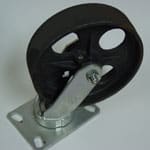
Ductile iron wheels are great for use on rough floors and in applications where there’s metal chips and debris. Because they’re made from iron, this style can withstand heavy loads without breaking or deforming, and they have incredible impact, wear, and heat resistance.
Phenolic
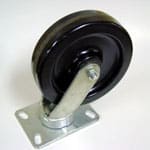
Phenolic wheels don’t leave scuffs or marks, so they’re great if you have hardwood, vinyl, or tile flooring. They’re also lightweight, sparkproof, and quiet. Despite them being lightweight, they’re still capable of carrying heavy loads and can withstand high-traffic environments. They are highly resistant to chemicals, solvents, oils, moisture, and temperature fluctuations.
Rubber

Rubber wheels are ideal for light hoppers and smooth or slippery floors. They roll quietly and can absorb shocks and vibrations from uneven surfaces but may leave tread marks on the floor. These wheels can be used both indoors and outdoors because they are UV-resistant.
Removable Pad
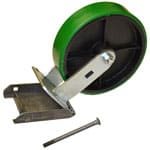
This wheel style features easily removable pads. The primary benefit of this is easier maintenance and replacement. When pads wear down or get damaged in traditional designs, they can be challenging to replace, especially if they’re integrated without a screw or clip. And, if the pads are made from rubber or polyurethane, they could be glued or molded onto the wheel. That’s not the case with removable pads—with this style, all you have to do is unfasten the nut from the bolt in the mounting plate and slide the caster from its bracket. You don’t even have to remove the wheel from the hopper.
Polyurethane
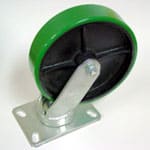
Polyurethane wheels resist abrasion, maintain their shape even under heavy loads, and are non-marking. They’re generally more quiet than steel or phenolic wheels but not as quiet as rubber. Polyurethane is resistant to many chemicals, oils, and solvents, and can be manufactured at varying hardness levels based on application needs. These types of wheels can also be used outside if needed because they do not degrade easily when exposed to the sun or extreme temperatures.
Polyolefin
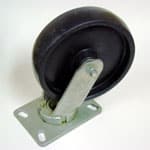
This style rolls easily, doesn’t leave marks, has good chemical resistance, and has high shock and impact tolerance. Polyolefin wheels can be used on both smooth and rough floors, but their load capacity isn’t as high as steel.
How to Select the Right Style
When selecting among the different styles and types, consider your application and environment.
- What is your load capacity? If you have to transport heavy-duty materials frequently, ductile iron and phenolic can be good options. Load capacity will also help you determine the diameter of wheels you need. Larger wheels can handle larger loads.
- What types of floors do you have? If the wheels will be moving around on different types of surfaces, use polyolefin, polyurethane, and phenolic which are good on smooth and rough surfaces. If non-marking is important, you don’t want to use iron or rubber, which will leave marks or scuffs on sensitive surfaces. If you’re only moving the hopper around on rough surfaces, iron is the best choice. And, like load capacity, floor type will also dictate the wheel diameter. Larger wheels are good for rough surfaces, but smaller wheels can handle varying floor types better.
- Is noise level a concern? If so, rubber and polyurethane are the quieter options, with rubber being the most quiet.
- Will the hopper be exposed to chemicals or oil? Phenolic wheels have the best resistance to chemicals, oils, and greases. However, polyurethane and polyolefin are good choices.
- Are there any other environmental factors? Will the hopper be exposed to sunlight, varying temperatures, or moisture? If so, polyolefin and phenolic wheels will be the most durable.
- What are your maintenance requirements? If you need easy maintenance, removable pads will be the best option. However, you need to ensure that the materials the wheel is made from can still withstand your environment.
Find Your Solution Today
There’s no one-size-fits-all solution for caster wheels, so contact our experts at Roura Material Handling if you still have questions. Our product specialists can help you find the best wheel type (and hopper) for your application.